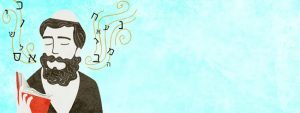
Art by Sefira Lightstone
A WEEKLY TORAH THOUGHT FROM RABBI MORDY
The world is an ever more confusing place. It seems that chaos and craziness abound; war, famine and strife are literally everywhere. And yet, we must search for the good. There has to be something out there to zero in on and from which we can take inspiration, right?
This week’s Parsha (Emor) teaches lessons regarding the Kohain (High Priest) in the Tabernacle and Temple. The Torah is very precise regarding who can, and cannot, perform which activities. We also find something quite apparently disturbing: A Kohein with any physical disabilities or outward “blemishes” is essentially unable to perform many of the rituals in the Temple. This is disturbing to say the least, this is discriminatory and a reflection of an antiquated, outdated mindset that fortunately doesn’t exist in practicality today. Or is it teaching us something more? Maybe there is something here that isn’t to be taken at face value? I’ll do my best to explain the best lesson from this. There is a law that tells us that should someone have these physical disabilities in the Messianic era, they would be able to perform, unlike in today’s pre-Messianic time. Why? What will be the difference between the times that are to the times that will be? What we know about the Messianic era is that our perspective will shift. We will be able to see the goodness and G-dliness within each and everything. And so why will that make a difference in this case? Because the reasoning behind the laws in this Parsha is not to fault any Kohain himself, but to ensure that the Temple be a place where only positivity should be found. So why would a Kohain with a physical disability not bring about that positivity? G-d created this Kohain just as he did a “typical” Kohain! Yes. This is true. However the perspective of the flawed people around him is that they would see this Kohain as having a disability and therefore might have negative thoughts. So is it the Kohain? Not at all. When the perspective of those around him change, he can perform the activities with vim and vigor, but society needs to adjust properly in order to make that happen. It is not the flaw of this Kohain, it is the flaw of society around him to not properly see this Kohain as a perfect G-dly creation. When that is corrected, this Kohain will assume his rightful place.
What is the lesson for us? “If it bleeds, it reads,” they say. We read so much negativity in the news and yet, let us think of what could possibly be happening, good things, happy things, positive things that don’t make the news because they don’t fit in the flawed world we live in. The Torah could have commanded all the people to think positively around said Kohen, but it knows just how flawed humankind is. If we take it upon ourselves to focus on the positive, if we find the good, ultimately we prepare ourselves for that Messianic time that is truly good, for all mankind. May it happen immediately. Good Shabbos!





